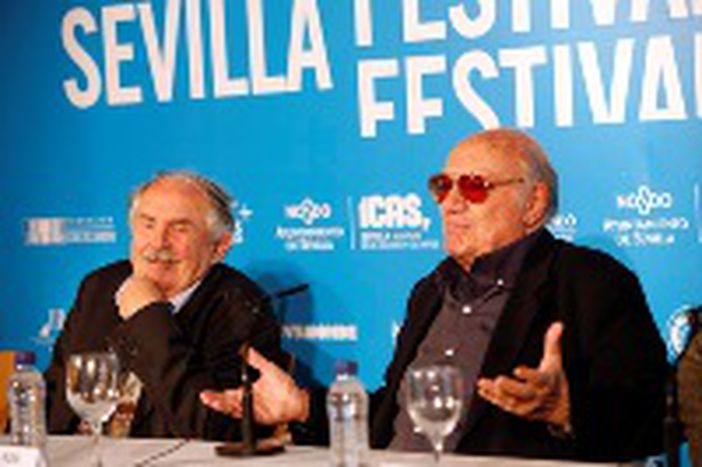
Rolling out the blue carpet
Published on
Translation by:
Nabeelah ShabbirThe British film ‘Venus’ by Robert Michell scooped the main prize, whilst German films swept the board
‘European cinema is a cinema of emotions, a cinema of sensations, of small and grand stories,’ declared Manuel Grosso, director of the Festival of European Cinema, in Seville last week.
The European Cinema Festival is so distinct that even the red carpet familiar at premieres in San Sebastián or Venice, graced by the likes of Kenneth Brannagh and company, is a European blue.
Italy takes up its jousting sticks
‘Italian cinema is coming back with a boom with a new generation of directors’, says Grosso on the first day of the festival, ‘and above all with films like ‘Crime Novel’ by Michele Placido, ‘The Crocodile’ by Nanni Moretti, ‘The Golden Door’ by Emanuele Crialese, or ‘Red Like The Sky’ by Cristiano Bortone’.
This was the motivation for the European Cinema Festival to this year devote special attention to Italian cinema. During an entertaining two-hour masterclass given by the maestros of neorealist Italian cinema, including the director Tonino Guerra, the Neapolitan director Francesco Rosi highlighted how, ‘the current post-war neorealist trend in Italian cinema is an ethical requirement; to better understand and to get to know the country. More than being a socialist and propagandist discourse, it was the base of a moral duty to be fair and supportive.’
One might ask whether it wasn’t appropriate to return to the subject of the realism witnessed in the debate in Italy, about whether the army should or shouldn’t have been sent to Naples. In fact, Tonino Guerra recommended that Rossi ‘continue making movies’, to which Rosi’s sarcastic reply followed, ‘although I won’t rule it out, for the moment I prefer to dedicate myself to theatre.’
Germany sweep the board - with some big surprises
The British film 'Venus', by South African director Roger Michell, won the ‘Offical Selection’, taking away the ‘Golden Giraldillo’ award, and the 60,000 euros prize money. A story of emphasis for its ‘defence of the value of life and love’, according to the words of jury president Margaret von Trotta.
The ‘Silver Giraldillo’ award was awarded with a sum of 30, 000 euros to ‘The Life of the Others’ by German director Florian Henckel, which had already enjoyed success with seven prizes.
A lively spy film set in 1980s Germany, the award was even more timely amidst news of the recent death of the mythical German spy Markus Wolf, otherwise known as ‘The Man Without a Face’. ‘It’s a theme of incredible importance for Germany’, said the producer of the piece, Quirin Berg, ‘which really touched the hearts of the Berliners’. It is one of the favourites at the European Film Academy Awards, which will be presented on the 2nd December in Warsaw, together with ‘Volver’, the much-hyped offering from Spanish director Pedro Almodóvar, and Ken Loach’s British film 'The Wind that Shakes the Barley'.
In the ‘Europe-Europe’ section, another 60, 000 euros was awarded to the German director Sven Taddicken for his film ‘Emma’s Bliss’. It unfolds another intimate story about a terminally ill man with cancer who together with Emma, a lonely farmer, learns to enjoy the last moments of his life.
With regard to the documentaries, the prize for the ‘Eurodoc’ section once again went to a German film: 'Tailor-Made Dreams' by director Marco Wilms. It narrates the adventures of an Indian tailor who crosses Europe in search of his dream, and picked up the ‘Golden Giraldillo’ for best documentary film. Not even Lakshmi Mittal, the Indian who managed to acquire the multinational European company of steel, Arcelor, could have produced a feat like that!
(Photo micro: Mipan / Stock Exchange)
Translated from Alfombra azul sin contrastes para el cine europeo



